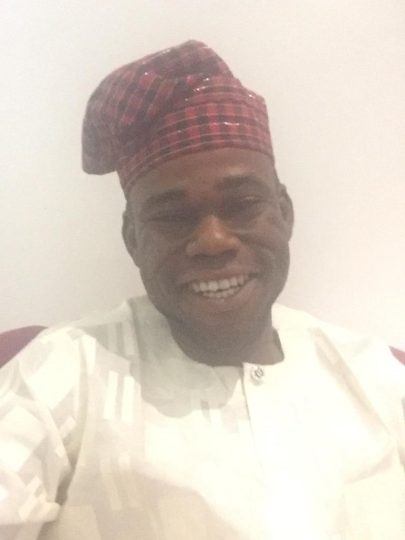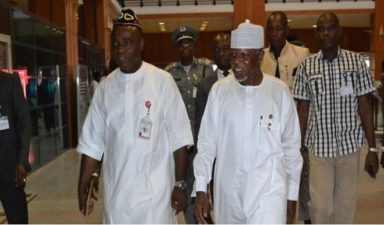By KAZEEM OYEDELE LAMIDI, PhD
This motion has been greeted with supportive and counter reactions across the Nigerian political spheres. Both deductive and inductive views have been used to present the exigent position of the Upper chamber of the National Assembly. However, it becomes essential to spotlight technicalities and strengths of the motion with a view to safeguarding not only the local democracy, but also providing a beginner’s guide to practical governance at local level in Nigeria.
It is important to stress that the political personality of Senator Abba Moro is not a subject of debate in this piece. Rather, the aim of this piece is to illuminate on how the motion could strengthen local democracy across States of the federation. More especially, State and local governments are principal agents of development with clear-cut tasks. More often, it is observed that the efficacy of State governments is at the detrimental expenses of the local governments. Moreover, the government status is not often enjoyed by the lowest level of government.
Although, the classical federalist principle does not expressly recognise local government as each, co-ordinate and indepedent unit of the federation. However, this does not sweep its legalistic existence, administrative convenience and development basis under the federalist carpet. It is a government, like any other government, though at the local level.
Political expediency must have necessitated the rationale behind the Senator Abba Moro’s motion. It is however a motion which provides working guide to the quest for local democracy. It seeks to reduce dominant state interference as it is currently obtainable across States of the federation. Beyond the interpretations of this motion within the Nigerian political spheres, this piece underscores technicalities and strengths of the motion which are legalistic in view and administrative in perspective. One of such is the legal stance on who should govern the local government space in Nigeria.
This motion re-affirms the fact that democratically elected representatives should be in charge of local government administration. Though, the Constitution allows the State governments to be in charge of putting in place Local Government (LG) establishment, structure and finance. Deductively therefore, the State government is expected to put in place democratically elected representatives across Local Government Areas (LGAs) as the governing structure in accordance with the constitutional provision. In clear terms, caretaker committee is anti-constitutional.
This is simply because the constitutional provision does not permeate the States to eternally set up the committee in managing the local government affairs. It becomes more absurd in the Nigerian political space whenever there is a change in government at the State level. The follow-up event is the political use of State House of Assembly to either suspend or sack the democratically elected councils. This brings no political sanity and socio-economic prosperity into the political space. Its attendant effect is of huge significant to the distortion of governance process and service delivery within the local spheres.
The state governments set up a caretaker committee to replace the constitutionally recognised council. While, the committee should merely serve an interim purpose, rather the committee system is being perpetually used in managing the local affairs as it is mostly found in vast majority of the States in the federation.
Numerous legal and political questions beg for answers thereby necessitating the suspended or sacked local council members to approach court of competent jurisdiction to defend their mandates. It is a common administrative knowledge that each level of government has tenure of office; of which local government is not an exception just like the state and federal governments.
Election is central to the start and end of office tenure at any level of government. If election has been instrumental to tenure of office at the state and federal levels, a crucial question for the State government, as its responsibility, is that: why can’t there be periodic local government election? In addendum to this motion, this piece also canvasses that the conduct of local government election should be a great condition for the federal support/grant to the States.
As a matter of exigency, the federal government should charge States to abide by the extant laws in coordinating the local government administration. One would wonder why there is no ‘usual’ instance of caretaker committee at the state level in a democratic dispensation. This is simply because the federal body, using INEC as an agency, is keeping constitutionally tab on the tenure of office across States of the federation. As such, the electoral agency at the State level (SIEC) should activate operational procedure for periodic local government election.
It is imperative to state unequivocally that the schedule of LG election should be slated in the second round of the General elections at every electoral cycle. This is not an impossible task to safeguard the stance of local government system in Nigeria. It is incumbent upon state governments to fundamentally support the activation process as a democratic exercise and means for establishing the governing structure at the local level in accordance with the constitutional provision. This constitutes the basis for establishing presidential system of local government in Nigeria.
The motion of Senator Abba Moro is borne out of the observed negligence and deviation by the State governments to the constitutional provision on local government. Also, the motion is sanction-oriented; such that any local government without democratically elected representatives should not receive its financial obligations in the Nigerian federal arrangement, especially on revenue allocation.
By implication, the adoption of this motion is to affirmatively gain the constitutional set-up and financial transparency for local government system in Nigeria. Local democracy and self-determination become more strengthened by the adoption of this motion. Although the political relevance and financial control might be some of the anxieties often entertained by the State governments.
This motion would not erode the inspectoral control and supervision of the State governments on the local authorities. There should be less weighing of relevance and superiority in governance space. All efforts should be geared towards fair distribution of political gains and social benefits for the people.
The over-standing quest for financial autonomy is another technical component of this motion. It is essential to appreciate the role of National Assembly in the constitutional amendment exercise. Most especially, notable support was given to the issue of financial autonomy which bothers largely on revenue allocation. This motion technically addresses the financial subordination of LGAs by the State governments. It could be viewed as an alternative response to the disruptive roles of the few State Houses of Assembly which thwarted the quest for LG financial autonomy in the constitutional amendment exercise.
It is an insightful motion which exhibits power superiority of the National Assembly over the State Houses of Assembly. Of note, the current administrative arrangement of joint allocation is the bane of the resistance by the State government to both financial autonomy to LG as well as periodic set-up of democratically elected representatives. The State government enjoys hegemony because it relies heavily on political and financial control over the structure and finance of local government.
This is evidently difficult to note any State government in Nigeria that does not rely over local government council for the State politics and local finance for the socio-economic activities of the State. This motion is however setting a beginner’s guide on how to, at best, carve political, financial and administrative niche for local government in Nigeria. It is to set LG to be relatively free from the state government’s whims and caprices. It is a Machiavellian motion which stresses a means to an end. Similarly, it seeks to technically achieve a long-time clamour for LG stance and relevance within the Nigerian federal arrangement.
This motion is an agenda-setting one with multi-dimensional effect on the local government system. It has political implication on the strength for self-determination in the policy and decision-making as well as inculcation of participatory culture in local politics. It is an important impetus to set out development outline within the tenure of office stipulated for local government system.
The strength of this motion lies in its capacity to conditionally secure revenue allocation to local government in Nigeria using the set-up of democratically elected representatives as a precursor. Also, the adoption of this motion will, on the one hand, enable citizens to be aware and conscious of what is given to the LGAs. On the other hand, the kind and amount of social services can be determined on the basis of the available fund to the democratically elected representatives.
This piece is stressing the working power relations that drive developmental agenda. In the same vein, the joint service provisioning becomes more obvious in terms of the magnitude and financial obligation of services rendered by the state and local governments. This will put an end to ‘forced’ collaboration that is obtainable in the current state-local fiscal arrangement.
However, the adoption of this motion does not manifest into absolute administrative efficiency and development. It is rather a beginner’s action towards setting up constitutionally recognised local council and framing developmental agenda. This piece seeks to encourage the Upper Chamber of National Assembly to debate this motion without political sympathy and sentiments. It is however maintained that it is a motion with positive intended and unintended effects.
It is expected to spur up supportive and disruptive views among stakeholders in the Nigerian governance space. It is therefore recommended that constitutional point of view, administrative transparency and developmental agenda should constitute evaluative yardsticks for either supporting or disrupting the tenets of the motion.
*Kazeem Oyedele Lamidi PhD is Senior Lecturer, Department of Local Government and Development Studies, Obafemi Awolowo University, Ile-Ife, Nigeria. Email: akandekande@oauife.edu.ng




